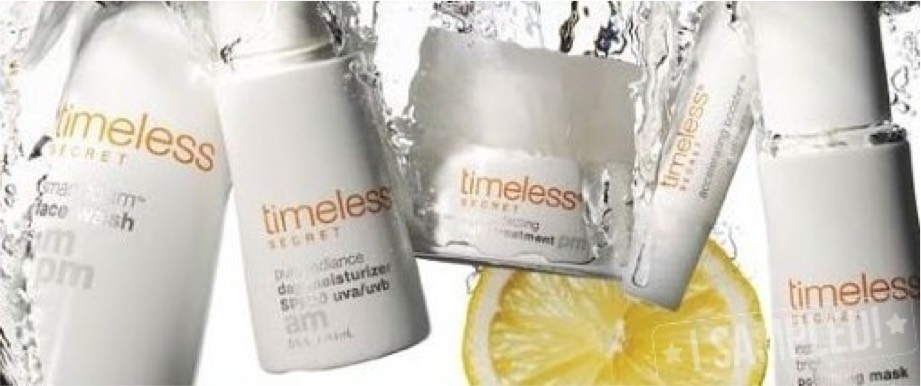I believe that Timeless Secret was actually a great product.
Originally — if I have the legend correctly — Timeless Secret was a small, successful brand sold in Las Vegas when Product Partners, looking to acquire a promising beauty line, discovered it.
This product was selected out of many and stood out as an absolute winner, boasting a unique combination of ingredients that, through a few simple steps, helped defy aging.
I personally used Timeless Secret for a couple of years, and I have to say, it was the first product I found truly compatible with my skin after moving to the U.S. from Russia.
Initially, I couldn’t find any affordable cosmetic brand that lived up to its promises.
Timeless Secret was perfect for me!
What I liked most about it: it consisted of just five products — a cleanser (which also acted as a toner and combined multiple cleansing steps), a day cream, a night cream, an eye cream, and a mask.
It worked well for any skin type and truly felt like a miracle product (and it still might be if you’re lucky enough to find what’s left of the stock).
Where I think things went wrong was in the brand owner’s lack of knowledge in beauty marketing.
Product Partners was (and is) a great company, but it built its fortune selling fitness products — DVD workouts, supplements, gear — essentially male-oriented products that thrive on aggressive, bold, repetitive, high-energy marketing.
That type of product demands constant visual reminders: fit people using the product, strong testimonials, and success stories.
Excited by their success in fitness marketing, Product Partners tried to apply the same strategy to their beauty line.
But beauty marketing is very different!
It requires a softer, more inviting, alluring, and unobtrusive approach.
Endless infomercials can’t dominate a beauty brand’s marketing unless they feature a trusted, beloved celebrity who has been known for years to use the brand and age beautifully.
(For instance, I might try Cindy Crawford’s skincare line, although even then, I wouldn’t buy the whole set — even with a warranty and a return offer.)
Another major mistake: Timeless Secret was offered on a subscription basis only — a big no-no for a new, unknown brand.
People don’t believe what infomercials say unless they can see real results.
Pictures of “real women” with smoother skin?
No, sorry — not enough.
Before trust is established, nothing works.
And you can’t build trust without giving people a low-risk opportunity to try the product first.
So, even though the product itself was good — and the price was VERY good (around $30 a month for something that genuinely made you look younger!) — the aggressive infomercial approach combined with mandatory subscription killed customer trust.
Add the relatively low price point (which often suggests low quality), and the skepticism only grew.
Of course, Timeless Secret had its loyal fans — women who were willing to try a trial set and weren’t afraid of subscription traps because they carefully monitored their spending and knew they could cancel if needed.
Those women LOVED Timeless Secret.
But because of how it was marketed, it never stood a real chance of becoming a lasting success.
What should have been done differently?
If it had been my product, this is what I would have done:
Massive sample distribution:
Samples should have been everywhere — in magazines, in malls, online.
Especially day and night creams paired together!
Samples should have been offered for free on the Timeless Secret website.
Product demonstration:
The cleansing foam alone would have been a sensation if offered as a free trial in stores or beauty counters.
The foaming mask could have been a second hero product.
Social media campaigns:
Facebook and other platforms could have been a goldmine!
A giveaway of even a few full sets would have created a loyal fan network, sparking organic word-of-mouth growth.
Contests, lotteries, and giveaways could have boosted PR significantly.
Short, premium commercials instead of infomercials:
No one wants to watch a 30-minute beauty sales movie.
Thirty seconds during prime time, ideally around a chick flick, would have been perfect.
Simple lines like: “The new sensation in age-defying skincare. Free samples available on Facebook!” — boom.
Everyone loves free samples.
No subscription pressure at launch:
Timeless Secret should have been available as a one-time purchase at first, with subscription options introduced later — after brand awareness and trust were built.
I would have offered one-month product sets for $19.99 instead of forcing three-month bundles at $39.95.
Single items could have been slightly more expensive to incentivize set purchases.
Within a month, customers would have seen the product’s value and naturally returned for more.
After enough awareness, then offer subscriptions — but sweeten the deal with irresistible bonuses.
Cross-promotion with fitness products:
Product Partners already had an array of fitness goods — protein shakes, vitamins, workout DVDs.
Imagine if each subscription box included a bonus: a 7-day vitamin pack, a protein bar, a mini-DVD workout sample!
Women would have loved the monthly surprise — and it would have cost the company very little while boosting sales across departments.
Beauty ambassador program:
Taking a cue from the Team Beachbody Coach model, they could have launched a beauty ambassador program.
Even if beauty results aren’t as dramatic as fitness transformations, passionate customers could still spread the word authentically and effectively.
